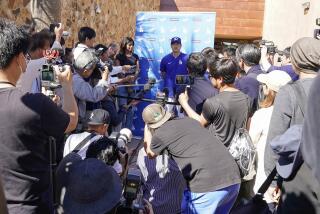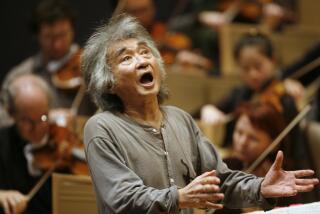Yukiko Okamoto Scales the Heights of Japan TV
- Share via
TOKYO — Yukiko Okamoto is the only woman TV producer at Japan Broadcasting Corp. (NHK), the Japanese counterpart to PBS in the United States.
Okamoto doesn’t look the part. Shy and soft-spoken, she seems more patient than persistent, more kind than critical. Yet for all of her fragile exterior, she is responsible for many award-winning hits, ranging from the Far East’s Galaxy Award for “Oshin” to “The Sign Post,” which won the grand prize for a single drama at a festival in Prague, Czechoslovakia.
U.S. television viewers may be familiar with the “Oshin” series, which played there and in 20 other countries, including China, Australia, the Philippines and Iran.
“It aired daily in Japan for almost a year; we did 297 episodes,” Okamoto said during an interview at the impressive NHK Studios in Tokyo.
She is dividing her time between here and France, where she is working on another dramatic production. “It has two titles--one Japanese, one French,” she explained. “Roughly translated, Americans would call it, ‘People in Suspense.’ ”
Okamoto has projects scheduled through 1991. One of the most exciting will be a film in high definition TV about whales, based on C.W. Nicholson’s novel, “Isana.”
How did she become the only woman producer at NHK?
“It was 1960, and I was young and eager,” she explained through an interpreter. “I came to the TV company in the hopes of being an actress. Instead I got a job behind the camera. That’s where I stayed. Thirteen years ago was a low point--both my parents passed on within months of each other. I was single and still working as an assistant director.
“Another two years passed, and I became assistant to the producer, then on my 21st year with NHK, I was promoted to producer of dramatic series.”
Today she is executive producer, drama division.
“Perhaps the company wanted to have a woman in production, and I was the target. No one said to my face that I did not have a profound education, but maybe I was promoted ahead of men my age because they wanted a female symbol.”
As a woman, Okamoto has had to work against certain stereotypes. “It is assumed that women get caught up in small details. I always try to get the overview. My father was a doctor and he advised, ‘Don’t concentrate on one tree, you’ll miss the forest.’ ”
Like any producer, Okamoto has had her share of temperamental performers. “Many actors are self-centered, and keen on how they are being used in the script. Often they want to change scenes, so I am on site most of the time, at the studio or location. If they have a good point, I will OK a change. If not, I must talk and talk,” she said with a smile.
What was the high point in her life? She didn’t take a second to answer. “Meeting my husband when I was 44.”
Okamoto’s husband is a director at NHK. “We met on the production of ‘Oshin,’ ” she related. “Two months later he called me on the phone and said he wanted to have a wife who would be by his side at his deathbed.
“Perhaps I came on too strong,” she giggled, “but I told him my grandmother died at 99, and he proposed.”
They have been married five years, but while she is based in Tokyo, he’s been transferred to Osaka. NHK prohibits husbands and wives from working together. “We don’t spend too much time together. It is compulsory to retire at 57, which gives me eight more years. I hope then to become a good wife.”
More to Read
The complete guide to home viewing
Get Screen Gab for everything about the TV shows and streaming movies everyone’s talking about.
You may occasionally receive promotional content from the Los Angeles Times.






